Author: Susan George
Rev. Stephen McKinney-Whitaker • Pastor
March 27, 2025I’m excited to announce that next year — March 7-14, 2026 — Derry Church will sponsor a trip south to explore the roots of the Civil Rights Movement. Participants will travel from Atlanta to Memphis, with stops in Montgomery, Birmingham, and Selma, to learn about those who fought for civil rights in that turbulent time.
The tragedies and triumphs that took place during the Movement in the 1950s and 1960s awakened an entire nation to the reality of racial injustice African-Americans faced nationwide. In that era, African-Americans fought to gain equal rights in the United States and were met with resistance, and often violence. We can learn from their struggles, their successes, and their perseverance, but also from the mistakes and abuses perpetrated by the nation, the church, and individual Christians so we do not make similar mistakes in the future.
In order to better understand the Civil Rights Movement, we need to walk through the places where it happened and learn from those who shaped it. So we are partnering with Dr. Todd Allen of Messiah University, who has developed relationships with veterans and scholars of the Civil Rights Movements over the 25 years he’s been leading these tours. Click here to watch a 30-minute documentary about a past trip.
Dr. Allen says,
The fight for civil rights in America spanned decades and locations. During this journey participants will visit many of the key Southern sites of the freedom struggle and along the way engage with veterans of the Movement hearing first hand their testimonies of what it means to stand up for freedom, justice, and equality then and now.
Lynn George, daughter of Sue and Jim George, joined Dr. Allen on a 2023 bus tour and had this to say:
Travel always expands your world, but this trip makes history come alive. I thought I knew the history of the civil rights era, but this pilgrimage opened my eyes to the realities of living and fighting for the rights I take for granted every day. Not only do you walk in the footsteps of civil rights leaders, but you visit historical sites and meet with civil rights leaders as they tell their stories. This is not an easy, vacation-style trip: this adventure will rock you to your core and make you realize that everyone has a role to play in fighting against injustice.
My hope is that we will gather a diverse group of Derry travelers that spans the generations. I believe this trip will be an eye-opening, sobering, but ultimately hopeful and life-giving journey that will inspire us to continue to proclaim God’s word, share God’s love, and practice God’s justice.
If you would like to experience and explore the roots of the Civil Rights Movement, let me know. I will keep a list and share updates, itineraries, cost, and how to sign up for the trip later this year.
March 2024 Session Highlight
March 26, 2025- Welcomed new members: Joong Mo & Hwayoung Ahn, Kelsey & Scott Kuntz, Dennis & Kelly Renaud, and Rachael Shocket & Kane Haga.
- Received the Treasurer’s report for the month of February.
- The Session discussed the Capital Procurement Requisition submitted at the February meeting which proposes installing two monitors in the Lounge for viewing and participating in the 10:30 worship service. This CPR will be voted upon at the April meeting, allowing more time for committee discussion, and to encourage people to visit and worship in the area on Sunday morning.
- Approved the installation of new cabinets and sink in Derry Discovery Days’ Ladybug classroom and the installation of a playhouse in the playground area. Both projects will be paid for by Derry Discovery Days.
- The Building & Grounds Committee requested approval to purchase new security software at a cost of $7,000 to be taken from the Capital Facilities fund. The request was approved.
- Pastor Stephen submitted a sabbatical proposal for early spring of 2027. During the sabbatical, he plans to focus on the political and theological aspects that led to the rise of Wiemar Republic and Nazism in Germany and what role, if any, the church should play in politics. He plans to study theologians and Christian leaders such as Bonhoeffer, Barth, and Niemoller. The proposal was approved.
- The Christian Education and Mission & Peace committees recommended that the Session approve a proposed Civil Rights tour for March 7-14, 2026 exploring the roots of the Civil Rights Movement and learning about those who fought for civil rights in the 1950s and ’60s. The tour will partner with Dr. Todd Allen of Messiah University who has been leading these tours for over 25 years. The proposal was approved.
- Approved Craig Kegerise to assist Summer Hakkinen with counting and depositing church offerings.
- The Building & Grounds Committee submitted a proposal for Sanctuary choir loft
renovations to address safety and acoustical concerns. More information on the proposal will be presented at a congregational information session to be held after the 10:30 am April 13 (Palm Sunday) worship service in the Sanctuary.
Pam Whitenack • Derry Member
March 20, 2025While today the role of women as leaders in the church is not questioned or challenged (at least not at Derry Church or the PCUSA), it wasn’t until the early 20th century that the Presbyterian Church began taking steps to recognize the rights and benefits of including women in leadership roles.
The development of Presbyterian female leadership followed trends in the United States. In August 1920, Presbyterian President Woodrow Wilson signed into existence the 19th Amendment to the Constitution of the United States granting women the right to vote. As women were gaining ground in public matters, they gained ground in ecclesiastical affairs.
During the 19th century women had established organizations apart from men. Women became deeply involved in the support of and participation in educational endeavors such as Sunday Schools, and home and foreign mission work. They formed their own societies to further causes that interested them. At Derry, one of the Presbyterian church’s oldest women’s missionary societies was established in 1838.
For Derry Church, women also played a critical role in the construction of the Chapel in 1884. It was largely due to the efforts of two women that our Chapel was erected. Mrs. Charles Bailey of Harrisburg, a descendant of one of the original founders, became interested in reviving the church at Derry. She succeeded in interesting Mrs. Dawson Coleman, of Lebanon, in this goal. Given the fact that Derry Church had only six or seven members and no pastor, this was a bold undertaking. They sought no recognition and their efforts and leadership for this project were hidden to history by the public records signed by their male counterparts.
While they might not have had the opportunity to serve as Elders, Deacons, or Trustees, Derry’s women’s groups played important roles supporting and funding the church. Women also led the way in promoting and funding various mission projects.
The Ladies’ Guild, established in 1909, played a significant role in Derry Church life. In addition to Bible studies and fellowship, fundraising played an important role in the Guild. During the Guild’s first ten years, these women raised funds to improve the Chapel building. Fundraisers were often held in downtown Hershey because there wasn’t space for such events in the Chapel. The women held strawberry festivals and oyster dinners, sold magazines such as McCall’s and Ladies’ Home Journal, sewed and sold aprons, and even offered weekly embroidery and crochet lessons to add to their treasury. With their funds, the women paid for pews in the Chapel, repaired the church walls ($150), tuned the Chapel piano, purchased a Brussels carpet ($263.75) and the church’s first electric vacuum cleaner ($20.38). In 1917, the Ladies’ Guild paid for Derry Church’s first indoor toilet.
The Women’s Missionary Society offered mission study classes. Each month was devoted to studying a particular group or issue, such as migrants or China, to raise awareness of the worldwide need for financial support. These efforts encouraged Derry’s interest and commitment to supporting mission work.
The Presbyterian Church first granted the right of women to serve as “brother deacons” (as they were called) in 1922-23, and “brother elders” in 1930. Many churches, Derry included, were slow to recognize the value of including women in leadership roles in the church.
Derry Church ordained its first women as deacons in 1957. That year Ruth Hoffer and Alma (Mrs. James E.) Bobb were elected to Derry’s Board of Deacons. They would be the first and last women elected to one of Derry’s Boards until 1971. There are many possible reasons. The pastor who had encouraged the inclusion of women in 1957 took another call in 1959, and Derry’s next pastor, Reverend Ira Reed, faced many challenges when he first arrived: building a new sanctuary, confronting growing social unrest regarding civil rights for women and people of color, the VietNam war, and significant social change. But throughout the 1960s, the topic of women serving as Elders and Deacons was under consideration by Session and the congregation in general.
In 1969, when the Nominating Committee was seeking candidates for various church offices, the committee discussed whether women should serve as officers. While the committee did not nominate any women to the Boards for 1970, early that year Clara Owens, a member of the Nominating Committee, conducted an informal survey with the question: “What do you think of having women as officers of the church?”
The responses were published in the February 1970 church newsletter. Some of the responses:
“Why not?”
“I can see them serving as Deacons and Trustees, but to as Elders. I feel that the position of Elder should filled by a man.”
“I see no reason why women should not serve in an official capacity in the work of the church if they are qualified. Everyone should commit themselves fully to the work of the church.”
“Whether a church officer is a man or woman is not important. It is the fact that the person have the spiritual qualities and good sense that God would want a church officer to have that is important.”
“Women are active in other areas of the church and should therefore serve as officers.”
“It is a good idea, but they should not be in the majority on any of the boards.”
“Women are as qualified as men and sometimes they have more time to get to the meetings at church.”
“I am a fence sitter and have thought about this for many years. Women definitely have their responsibilities in the work of the church, but I am not certain that one of their responsibilities is as Elder. If women are to take their place as members of the Boards, I do feel that there should be two on each Board, not just one.”
These responses encouraged the 1971 Nominating Committee to include one woman, Josephine Baum, to be elected to the Session. The following year, Clara Owens was ordained as an Elder and in 1973, two women were elected to the Session. Since that time, women have been elected to each class of Elders and Deacons.
Dan Dorty • Director of Music and Organist
March 13, 2025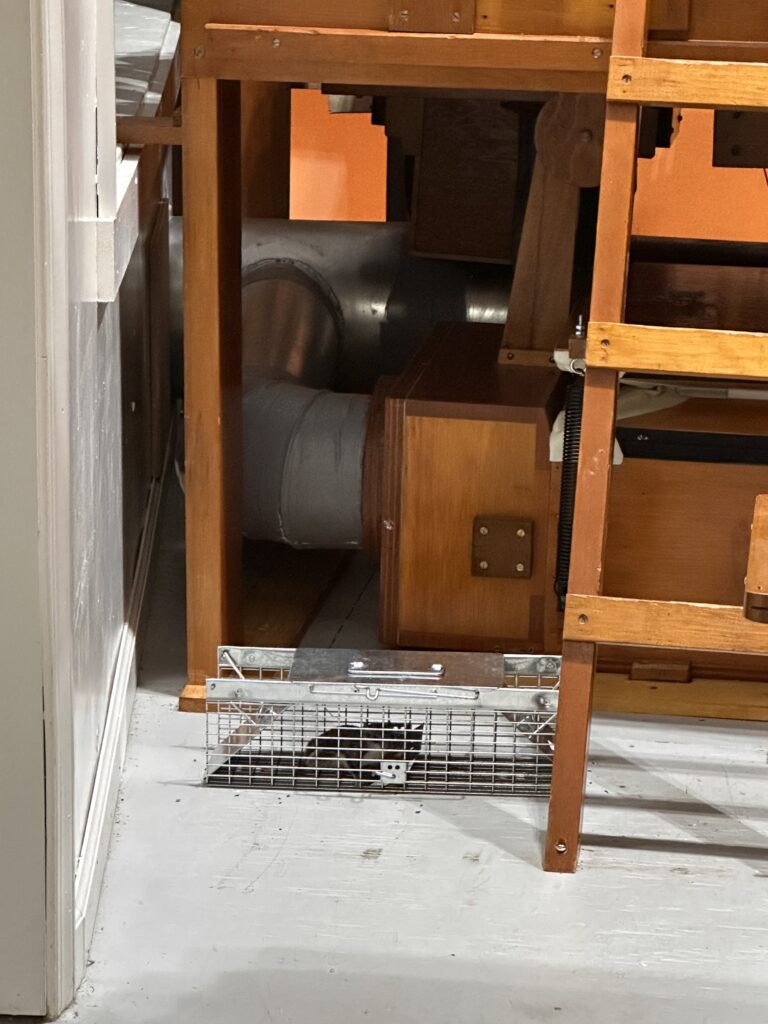
We’ve all heard of bats in the belfry, but have you ever heard of squirrels in the organ? In November and December last year, we discovered that a couple of adolescent squirrels had made their way into our building and found plenty of places to hide their winter acorn stores among the 2,795 pipes of our Aeolian-Skinner pipe organ. With the help of Shawn Bentley, the squirrels have now been rehomed and returned to the trees to roam freely.
These fluffy-tailed creatures are known for hiding acorns in organ pipes, chewing on metal pipework like a tin can, severing wiring, and enjoying the Italian leather that seals the corners of the bellows. As you can imagine, I was concerned about the potential damage that might have occurred during their stay. In conjunction with the infestation, I noticed that the organ was losing air, especially when it was played with all the stops engaged. This indicated that there were significant leaks within the instrument. There were numerous possibilities for these leaks, including the wind lines, wind chests (where the pipes sit), bellows, or even the blower itself.
Nicholas Thompson-Allen and his team arrived in Derry last Monday to assess the damage to the instrument. Fortunately, our worst fears—that squirrels had caused extensive damage—were unrealized. The bellows, pipes, wind lines, and wind chests showed no signs of gnawing. However, we were still left wondering about the source of a massive air leak.
After hours of searching the organ chambers, Nick eventually identified the leak beneath the floorboards of the chamber. On Tuesday morning, the team cut into the floor and discovered a displaced large rubber gasket on the main wind line. This gasket had been dislodged for many years and worsened recently due to deterioration. This deterioration likely dates back to when the Reuter organ was still in use here at Derry. After installing a new gasket and ensuring everything was in proper working order, our majestic instrument is now functioning beautifully, playing better than it ever has during its time here at Derry. My deepest gratitude goes to Shawn Bentley, Nicholas Thompson-Allen, and the entire team. Our magnificent instrument now sings with all its might and grandeur.
Kristen Campbell • Derry Member
March 6, 2025Editor’s Note: On the first Thursday of each month, the eNews feature article highlights the mission focus for the month. In March we’re lifting up the One Great Hour of Sharing offering.

As we enter the season of Lent, Derry Church invites you to take part in the One Great Hour of Sharing Offering, a tradition of generosity that continues through Easter Sunday, April 20.
Last year, thanks to the incredible generosity of our congregation, we surpassed our goal of $19,000. This year, we are setting our sights even higher, with a goal of $22,000.
Your contributions will be divided equally:
- 50% will support the Presbyterian Church (USA) through three vital programs:
- Presbyterian Disaster Assistance provides emergency relief and rebuilding communities affected by natural disasters.
- Presbyterian Hunger Program addresses food insecurity and supports sustainable solutions to end hunger.
- Self-Development of People empowers communities through economic initiatives and self-sufficiency programs.
- 50% will go to Bridges to Community, Derry’s mission partner in the Dominican Republic, where we’ll send a team in June to build a home for a family in need. This will be the 41st home built by Derry Church since the first trip to Nicaragua in 2001.
One Great Hour of Sharing (OGHS) brings hope and relief to those facing hardship, especially in today’s challenging environment, where rising food and shelter costs, along with job losses, are making it harder for many to meet their basic needs.
You can find OGHS envelopes in the pew racks or give online. Every gift, no matter the size, makes a meaningful difference.
Together, let’s make 2025 another year of generosity and impact.
Sandy Morales • Derry Member
February 27, 2025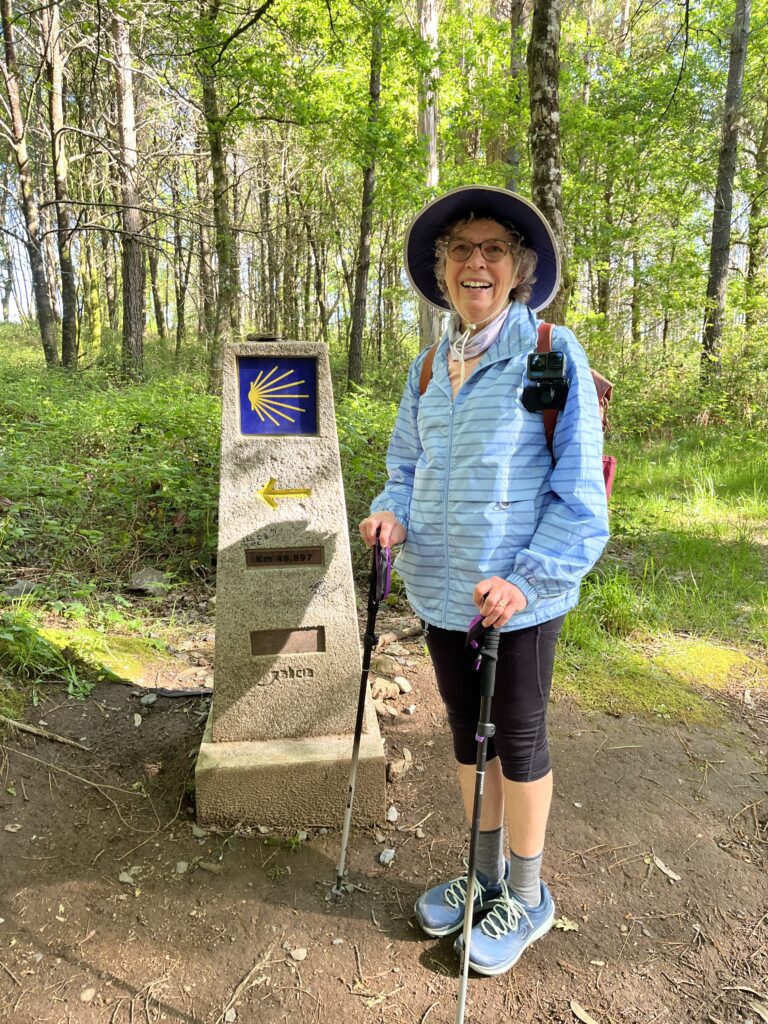
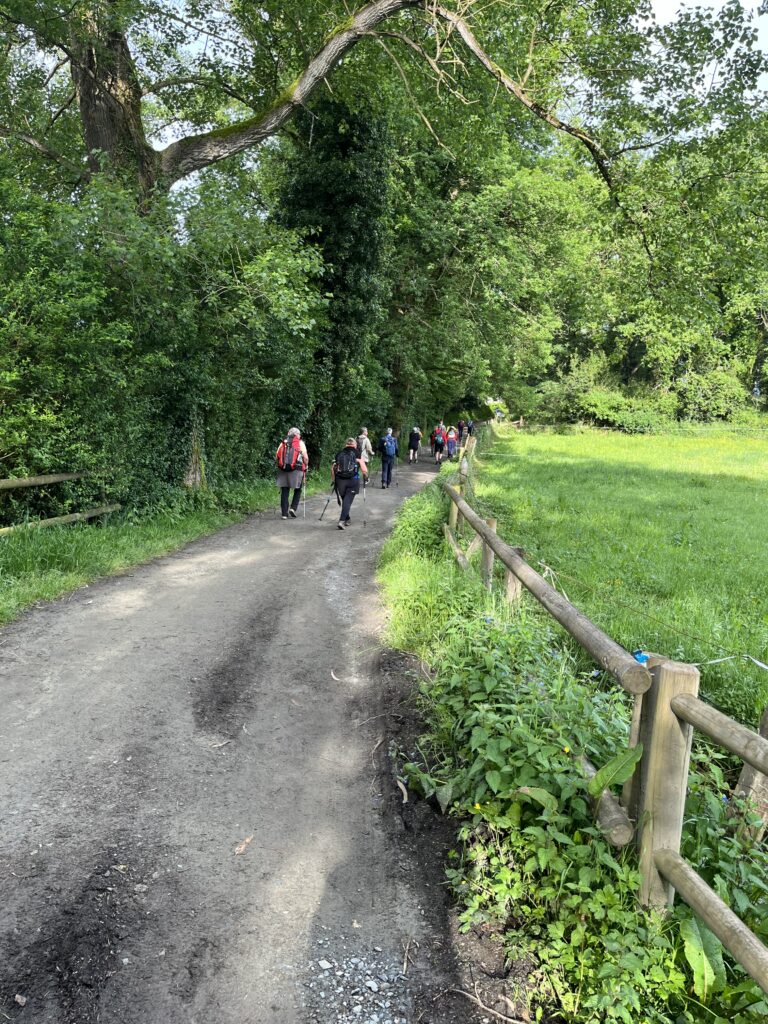
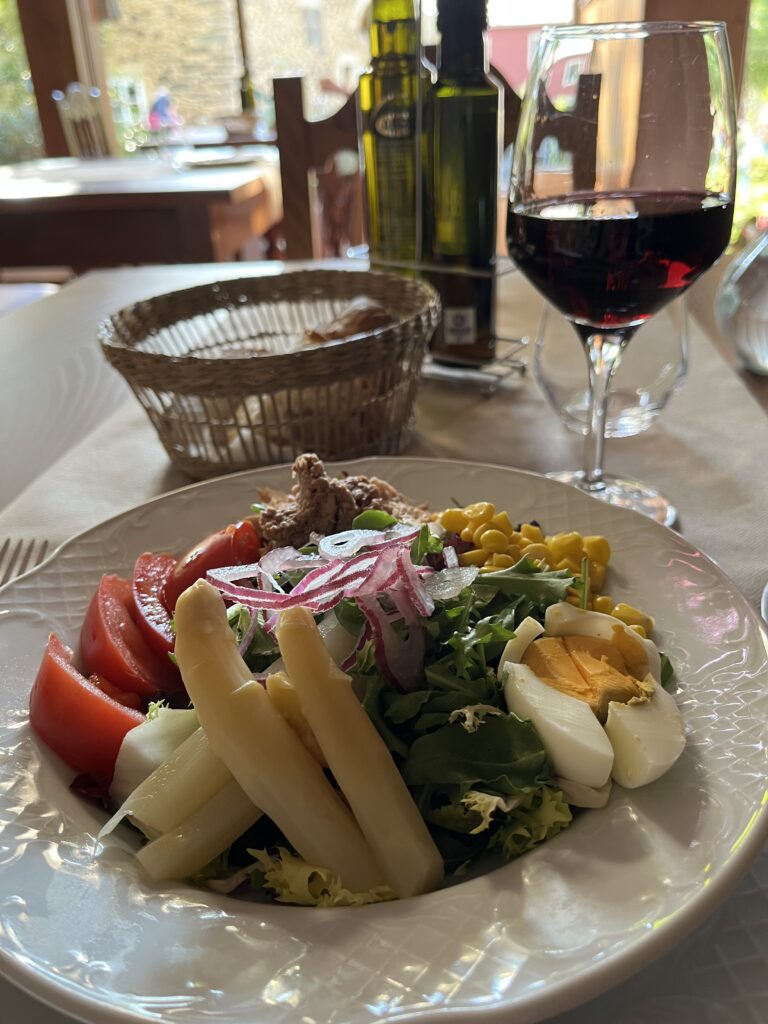
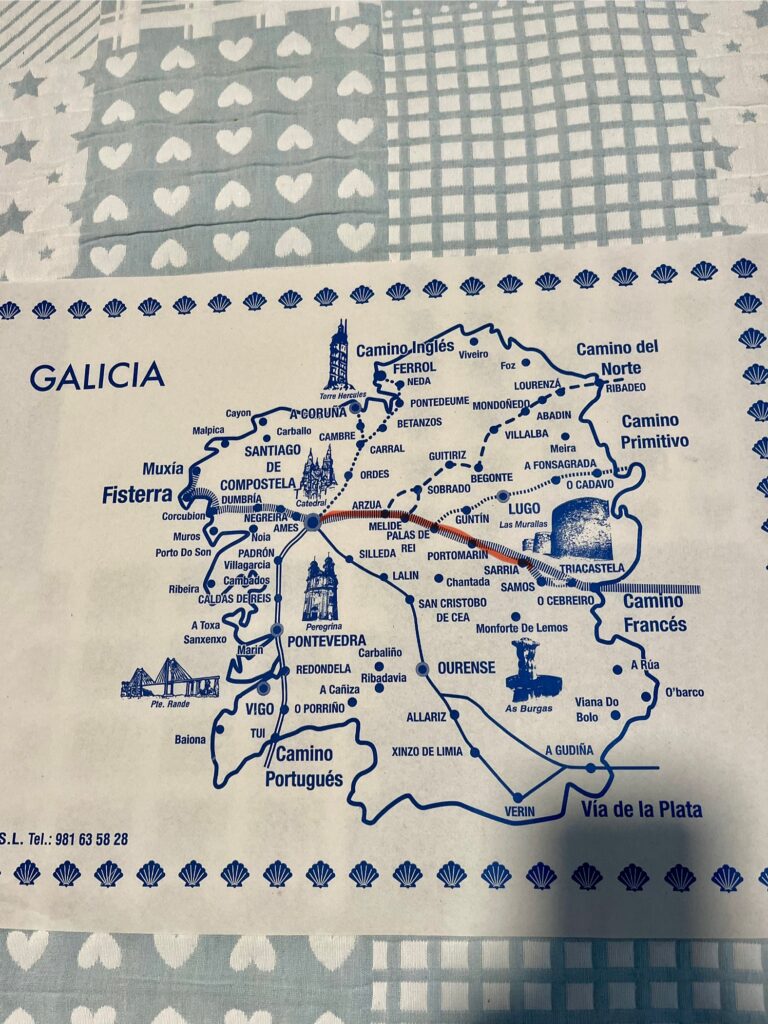
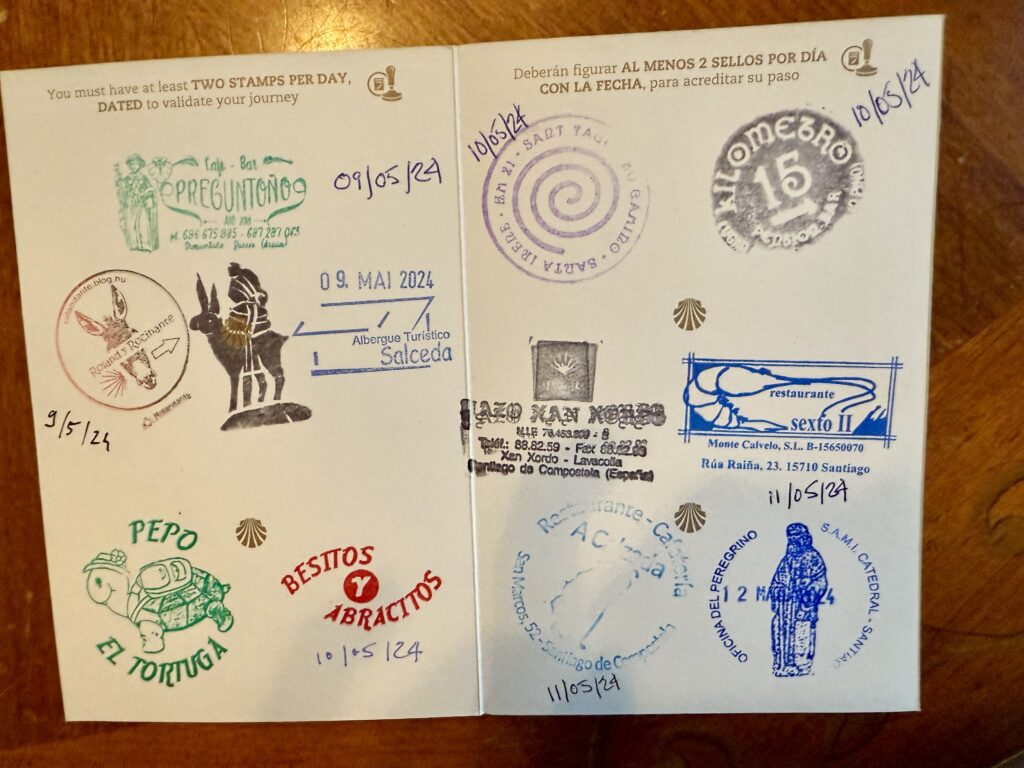
For ten years I had wanted to walk the Camino de Santiago in northwestern Spain. Last year, in celebration of a milestone birthday, I made the commitment and put my training plans in place.
The Camino de Santiago, or the Way of St. James, is a network of ancient pilgrim routes leading to the shrine of the apostle Saint James in the Cathedral of Santiago de Compostela. The pilgrimage has existed for over 1,000 years.
Traditionally pilgrims began their journey from their home, so there are many routes across Europe. Today’s pilgrims walk or bike the Camino for a variety of reasons: for many it’s a religious and deeply spiritual experience, for others it’s a challenging physical and mental test, and others enjoy immersing themselves in Spanish history, nature, and cuisine. Distances vary, but in order to earn the compostela — certificate of accomplishment — a pilgrim must walk at least 100 km. Pilgrims carry a passport and must collect at least two stamps a day as proof to the Pilgrim’s Office in Santiago that they have followed the route. I chose to walk a portion of the most popular route, the Camino Frances, from the town of Sarria to Santiago.
My eight-day walk was definitely the experience of a lifetime. The friend who had planned to join me on the journey became ill a month before the trip and needed to cancel. This meant that I travelled solo, which was a daunting prospect at the onset. Quite a few people that I talked with, though, commented that walking the Camino solo is the best way to do it, and they assured me that by the end of my journey I would have a new “familia.” I found this to be true and it was probably the most rewarding aspect of my Camino experience.
I met people from all over the world. We were simply pilgrims with no history or expectations of each other. There was a very strong feeling of community. You develop relationships on the Camino in a very unique way: you might walk with a person for a couple hours or have a meal with someone, share contact info, and then part ways, not thinking you’ll ever see this person again. Several days later you will meet up again either walking or having a café con leche along the way.
This brings me to my most important take-away from the Camino. I felt God’s presence with me every step of the way through my journey. I never felt that I was alone, even when I walked by myself for a couple hours. (There are guideposts all along the way with the yellow and blue scallop shell that is the symbol of the Camino pointing you in the right direction.) What started for me as a way of celebrating a milestone birthday became a journey of gratitude. I felt God’s presence in the beauty I saw in nature, in the physical strength and stamina I felt in my own body, and in my conversation, laughter, and shared stories with my neighbors from around the world. When I arrived in the plaza in front of the Cathedral in Santiago it was with tears of joy and gratitude.
I am now training for my second Camino, the Portuguese Camino, in May. If you are considering walking the Camino, I have recommendations for gear to bring with you, training, and how to plan your route and accommodations. You can contact me at smorales@email.com.
Amanda Bentley • Hospitality Coordinator
February 20, 2025
My name is Amanda Bentley. I am 36, a wife, a mother of two boys, (and two bonus boys!), and the oldest of four children. I owned my own bakery business for over 15 years, and have been working in the hospitality industry for over 20 years. I served and bartended for many of those years, and was very fortunate to be able to be home with my kiddos as they were growing up. I am also starting a women’s cooking class/bible study in my home starting in the spring, and really looking forward to what God has for us there.
My passion for baking came from a love for art, which I absolutely loved in school. Baking in itself was never my true passion, it was the art side that I craved. As I had children, I thought it would be awesome to be able to do their birthday cakes for them. And that’s where it all began. I started with cupcakes, and then worked my way up. Soon, I had more than just friends and family wanting desserts, so I decided to branch out, and 15 years later I am still creating.
Working in the professional field of hospitality for many years has been a highlight for me. I have also come to realize how much I love cooking, over baking. The love for food (and the occasional wine pairing!) has grown exponentially. I remember when I first started, my palette wasn’t exactly “adult like”. But getting to work beside some brilliant chefs, and gaining knowledge from them, has been a true gift. It made me realize not how much I just love food, and creating new dishes, but being able to serve others in the process, is what makes what I do, so much more heartfelt. Food is a connection point for all.
I am so thankful to be a part of Derry Church. I am coming to familiarize myself with everyone, coming up with new systems, and settling in nicely. Terrific Tuesdays are truly one of the highlights of my week. I always look forward to seeing everyone’s faces, some who I don’t get to see most of the week. There are many ideas that I have stirring up in my head, of events that I would like to do and make happen. One that we are moving forward with is a movie night! Also, working with Sue, we are going to start a new cooking series, which will range from super easy appetizers to a hearty, soul filling dinner, to sandwich ideas, to desserts! As we progress into the year, my hopes would be to provide everyone with healthier options for snacking, along with our terrific Tuesday dinners, and post worship fellowship.
If you ever have any questions, please feel free to reach out to me. Feeling very blessed to be able to serve such a wonderful group of people. Be blessed.
Rev. Shawn Gray • Associate Pastor of Christian Education
February 13, 2025Over the years of working at churches, I have been seen as the elusive young adult and have been asked to speak on behalf of all young adults. When I have interviewed for various positions in churches, there is one question that always comes up. This question even came up when I was being examined on the floor of Presbytery during my ordination. I was asked, “What can we do to get young adults to come to church?” At Presbytery I prefaced my answer with, “I don’t believe I should speak on behalf of all Millennials” but then I said, “There is no silver bullet.” I encouraged churches to ponder “Why do you want them here?” If pushed, I would explain that service and passion are often what drives young adult engagement.
The original understanding of church engagement has been:
- Visit a worship service
- Start attending regularly
- Become a member
- Serve on a committee
- Engage in service.
With millennials and younger generations, this pattern flips upside down. Young people begin participating with service projects that align with their values and passion. Service comes first. Then through relationships, they may begin to come to the worship service, or will be happy to share about the service project they are engaging in with the church in an effort to garner support. Membership may or may not ever happen, but if it does, it’s the last thing.
Pew Research shows that 18-39 year olds attend church less than their 40+ counterparts. Only 28% of 18-39 year olds attend church regularly, whereas 40% of 40+ year olds attend church regularly I have found younger generations do not like to sign the attendance book on Sundays, are not interested in membership, and may attend on a semi-regular basis but have a strong resistance to committing to join the organization. The response from faithful church members is often, “They should come.” I believe our task as the church is to examine how we, as a church body, exemplify the values and passions that matter to these younger generations. Instead of asking them to conform to what the church is, how can the church participate in missional opportunities that parallel what these generations care about? Is there anything that turns these young people away from the church?
This is the meaningful and challenging work of engaging with young generations. Simply existing is not enough to persuade these younger folk to attend church. We need to listen to how they see the church, then offer to partner with them in the ways that both support the church’s mission and the passion of these generations.
Carl Rohr • Derry Member
February 6, 2025When I relocated to Hershey in 2009, homelessness was a situation I never thought I would see here. It does exist, although we cannot always see it clearly in our normal daily routines. Backing up a few years, I relocated to the Harrisburg area in 1989. There were frequent signs of people living on the street, most noticeably when I walked to and from work on Second Street near Market Square Presbyterian Church. Yet I assumed it was just that way in a city even as small as Harrisburg.
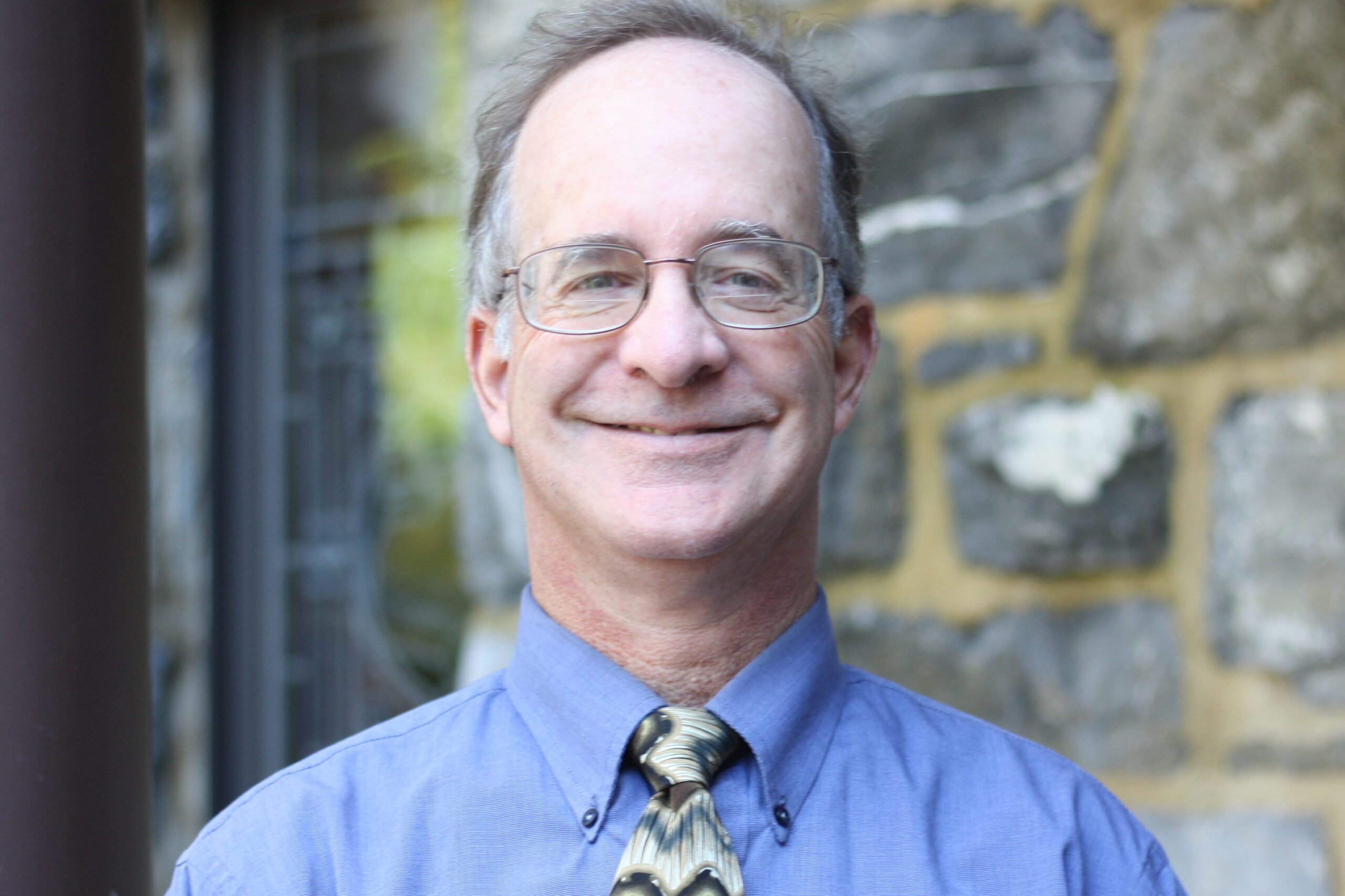
One of the first jobs I had was volunteering to drive a box truck from Carlisle to Philadelphia early on Saturday mornings for the purpose of picking up, transporting, and distributing foods for Project SHARE. This was in the early 1990s. I drove to a nondescript food distribution center in the city. It was there I first witnessed the human scale of lack of good food for so many, including the homelessness population in Central PA. Many local families were, and continue to be, served through this Christian ministry effort. Later on when I became a Derry Church member, I really learned about people living without a home in our area by volunteering to help deliver food to the Harrisburg homeless, often in very poor areas of the city. The local crisis has not eased; indeed, it has become more pronounced today.
Both Cumberland and Dauphin Counties have social service agencies and organizations to help displaced people who have no safe place to sleep, a kitchen to cook food in, or a roof to shelter from the elements. People often resort to staying in public parks, under bridges, behind storefronts in alleyways, and in their cars. The reasons are too numerous to mention for living in these places. I can tell you that living out of a car with all your tangible possessions is not a good feeling. Yes, local humanitarian organizations can and do provide help, but the help also needs to be accepted by the homeless recipient(s). Help comes in different ways: counseling services, temporary housing, job skills training, access to medical care, education and community living skills. Regaining one’s independence is a tremendous experience!
The Derry Church community helps many local organizations and people in multiple capacities. We provide stimulus funding to help people who live in a supportive environment with structure, learning, love, and Christian values. We continue to help meet the needs of many. Recently, a homeless young man came to Derry Church asking for help. The church provided enough to assist him with shelter, allowing him to regain some stability so he could work his way towards independence. This is who we are at heart.
The “Tiny Home” in Harrisburg greatly benefited from Derry’s support to construct one of several tiny homes built to help local homeless veterans. We have also helped a Syrian refugee family resettle in Hershey, and Derry members also give time and effort and financial contributions to these area non-profit organizations that sustain Harrisburg’s homeless population:
- Downtown Daily Bread
- The Harrisburg YWCA
- Interfaith Shelter
- Bethesda Mission for men and women
- Christian Churches United (CCU)
- Logos Academy
- Gather the Spirit for Justice (GTSFJ)
Let us never forget those who are in desperate need for the most basic of life’s needs including not only food, water and shelter but also love, kindness, someone who cares, and a healthy environment.
Isaiah 58:7 gives people the urgent command to share food with the hungry and provide shelter for the poor. Matthew 25:35-40 says that helping those who are hungry, thirsty, or without shelter is like helping Jesus. Showing compassion, kindness, and mercy to the homeless is something that we as members of Derry Church are called to do.
Jeff Hosenfeld • Derry Member
January 30, 2025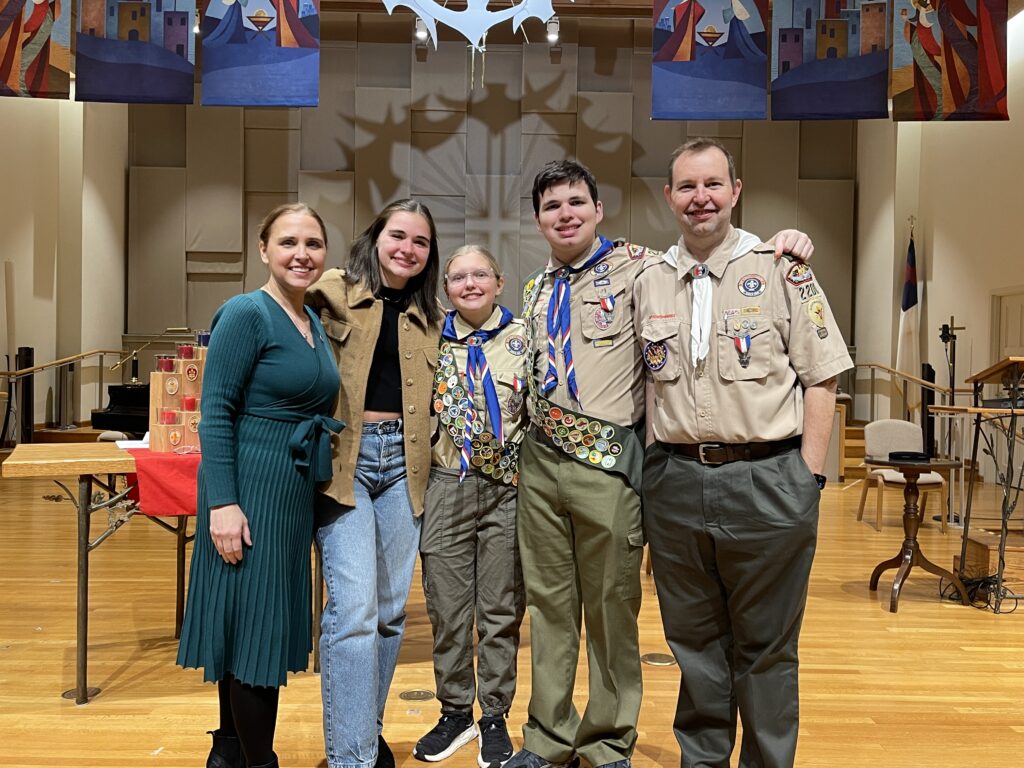
When people ask me what brought me to Derry Church, my answer has always been scouting. Shortly after we moved to the area, our first-grade son was interested in joining Cub Scouts and we were looking for the right unit, since there are many choices in the Hershey area. At that time, scouting units would assemble at the elementary school on Back to School Night and prospective scouts would visit the various tables and learn about each of the groups. We were drawn to Derry Church’s Pack 200 presentation mostly because they were so friendly and accepting – much like the greater membership at Derry. Having been raised Presbyterian ourselves, Jenn and I thought this would be a perfect fit for our son, and it was.
I was a scout in my youth and was thrilled that my son was enjoying his scouting experiences as he worked his way through the Cub Scouting program and eventually bridged into the Troop 200 Boy Scouting program that Derry also sponsors. My daughters were never interested in the Girl Scouting program, but that all changed a few years ago when my youngest daughter Adele joined Boy Scouts (now named Scouts BSA).
Most people know that for over a century, the Boy Scouts of America has been a well-established organization to provide boys and young men opportunities and experiences to make friends, develop leadership, and hone skills in diverse areas including first aid, cooking, athletics, outdoor appreciation, survival, faith, and personal development. But few people realize that in 2019, the national organization invited girls to join the program – allowing them access to all the same exciting programming that has been afforded to boys for over 100 years.
At the Cub Scout level (students in grades K-5), there are “dens” for each of the grades – allowing youth to engage in activities with same-age peers. Girls can be integrated into each of these dens, or units can develop gendered dens (depending on the membership numbers). At the Troop level (ages 11-17), there are separate units for boys and girls.
Troop 200 is the Scout unit that works with young men (and has been established at Derry for many years). Troop 2200 is the “newer” unit (formed in 2019) that works with young women. Scouts in both units follow the same scouting guidelines when it comes to advancement, programming, and opportunities.And they follow the same scout oath: “On my honor, I will do my best to do my duty to God and my country and to obey the Scout Law; to help other people at all times; to keep myself physically strong, mentally awake, and morally straight.” All of the traditional Boy Scout awards and opportunities (such as Eagle Scout, summer camp, Order of the Arrow, and high-adventure outings) are now available to both boys and girls. Troop 2200 has had four young women earn the rank of Eagle Scout within the last 12 months. Their names are on a commemorative plaque in the Narthex, next to the Troop 200 Eagle Scouts.
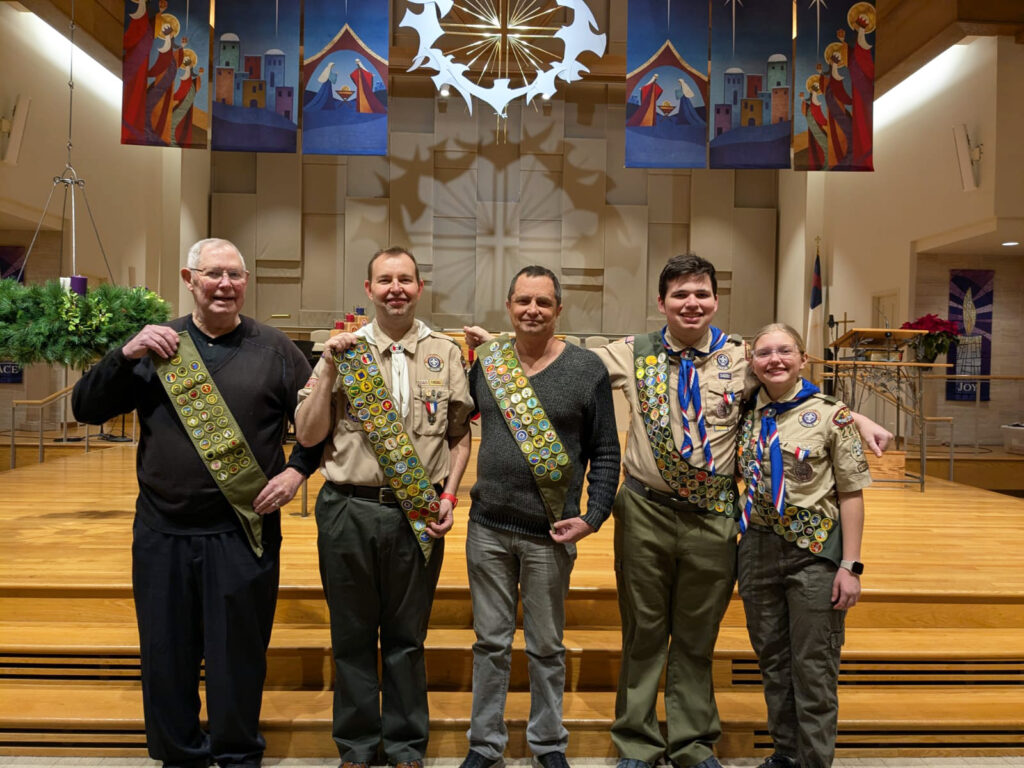
So why choose scouting? There are many activities for youth to get involved with and parents often get overwhelmed with choices. One of the greatest benefits of scouting is that the program is designed to help develop essential life skills such as problem- solving, confidence, adaptability, responsibility, and communication – in very fun ways. Most units have a meeting once a week for an hour with activities that focus on various scouting skills. At the Troop level, we participate in a weekend outing once a month, usually tent camping in the spring/fall, and cabin camping in the winter. Each outing is paired with activities such as high-ropes/climbing, hiking, rafting, biking, museums, swimming, and more.
As the Scoutmaster of Troop 2200, a great benefit I see to the scouting program is that it is designed to allow individual scouts to progress at their own pace. Some youth are driven to complete requirements and earn badges at an aggressive pace, and they can do so without being held back by the group. Similarly, other youth are less driven for advancement and more interested in just participating in activities and enjoying the company of their friends, and this is OK, too. Another wonderful hallmark of the Scouting program (at the Troop level) is that it is youth-led. The scouts elect a “Senior Patrol Leader” and establish various other leadership roles within the unit. Adults are present to guide and assist, but most of the planning and execution of activities (as well as the reflection and adjustment) comes from the youth. This helps young men and women develop leadership skills in ways that most other youth organizations can not.
We appreciate the church’s ongoing support of our scouting program and are always looking for ways to give back to the community. The scouts have participated in various service projects over the years, and would love to continue to do so. We also appreciate the support from the community when it comes to fundraising. We don’t have a large budget and the cost of providing opportunities for youth continues to increase each year. If you are interested in making a donation to one or more of the scouting units, you can send a check in to the church office and designate “Pack 200, Troop 2200, or Troop 200” as the beneficiary. Or you can make a donation during our spaghetti dinner on February 2.
Cub Scouting is open to boys and girls in grades K-5. Pack 200 meets here at the Derry Presbyterian Church on Monday evenings from 6:30-7:30pm. If you are interested in learning more or joining the pack, contact Cubmaster William Day.
Troop 2200 is open to girls ages 11-17. We meet at the church’s Scout House (located at the end of the parking lot past the cemetery) on Monday evenings from 5:45-6:45 pm. Contact me for more information or if you are interested in joining. Girls currently in 5th grade are eligible to join the troop this spring. Girls older than 5th grade are welcome to join anytime during the year: we have new scouts of all ages joining all the time.
Troop 200 is open to boys ages 11-17. They meet at the Scout House on Monday evenings from 6:45-7:45 pm. Contact Scoutmaster Chris Kalmbacher for more information or if you are interested in joining. Boys in 5th grade are eligible to join the troop this spring. Boys older than 5th grade are welcome to join anytime during the year.
A Message from Eagle Scout Adele Hosenfeld
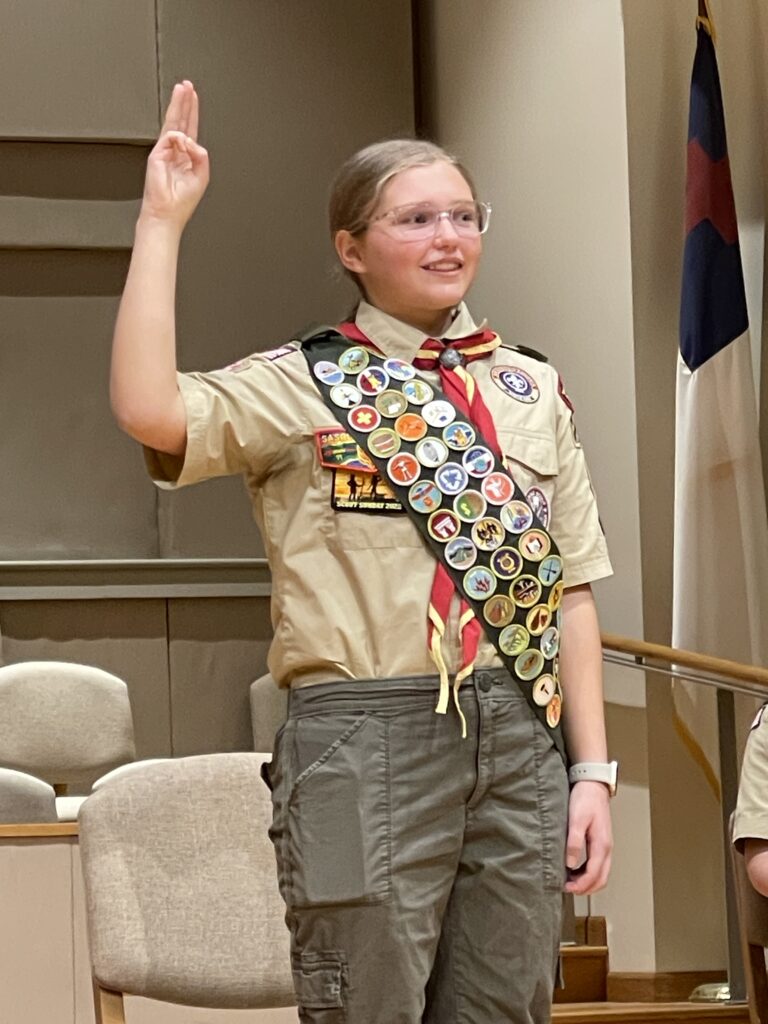
At my recent Eagle Scout Ceremony, I had the opportunity to reflect on my journey as a scout. I got to look back at everything that I learned and everything that I will keep with me for the rest of my life. And it was a very long list. Scouting has provided me with many opportunities to learn and practice so many skills, such as teamwork, communication, planning, first aid, leadership, organization, outdoor survival, and skills in all 42 merit badges that I have earned. But along with the many skills I have learned, I will also forever keep all of the memories that I made.
Troop 2200 has allowed me to meet some amazing people who have become some of my really good friends. We have gone to some really cool places, including a camp on the Chesapeake Bay, Washington DC, the film location for Friday the 13th, high adventure courses, mountains, lakes, bike trails, waterfalls, Gettysburg, and so many more. Having the opportunity to go on one trip every month has really allowed me to get some great experiences and do all sorts of exciting things.
As well as learning about all sorts of exciting topics including boating, shooting sports, arts and crafts, cooking, and so much more, I have participated in so many fun activities as I earned those merit badges. I have canoed and kayaked on lakes, prototyped my own chocolate bar, practiced my aim with a bow and arrow, designed and tested my own card game, and soon I will build and solder my own circuit for the electronics merit badge. These badges helped me learn about many different topics and fields that could potentially even be my career in the future. They have helped me explore what exactly is out there in the world.
I look back at a lot of memories that have stuck with me. And most of them are from times that something has not gone the way we planned, whether it be a technology problem, a weather problem, or anything that has prevented us from doing exactly what we wanted to do. In all of those situations, we have had to be flexible and adapt. Flexibility is one of the most valuable skills that scouting has taught me and allowed me to practice.
I would like to give a huge thank you to the church for being our chartered organization, and for partnering with me to complete my Eagle Project, which is the nature kitchen in the church playground.
Cyndi Camp • Derry Member
January 23, 2025Will you help change a life?
Derry’s Friends of Sargodha are asking for your help to provide an education to children in the third-world country of Pakistan. This designation means that there is high illiteracy, inadequate health care access and significant poverty, resulting in miserable living conditions.
The stories we hear from recipients of grants for education are both heartbreaking and heartwarming. In many cases, relatives of more than one family are living in one small home, because the adults aren’t able to support their families in any other way. The parents work very menial jobs. If illness or injury occurs, there may be no source of income at all.
The Presbyterian Education Board provides an education to any child, even if the family cannot afford it. Grant money, in the form of outside donations, helps to fill the gaps between what it costs to operate several schools and educate their nearly 6,000 students and what the students actually pay in tuition, a sliding scale based on need.
One school, the Christian Girls’ High School of Sargodha, has been serving that community for over 100 years. Currently more than 400 students receive quality, transformative education from nursery school through grade 10. Students receive remarkable scores in the state board exams, and today, graduates are pursuing higher education and professional degrees in greater numbers than ever before. Their success translates into enhanced standards of living for their entire families.
Many in Derry’s congregation give annually to help support scholarships, and we sincerely appreciate their generosity and faithfulness. We invite even more friends to donate any amount from one “share” of $40, to $400 to support a day student for one year, or $800 to cover the cost of educating a boarding student for one year. Click here for details on how you can join with Derry Church to fund scholarships for children in need across the globe.

Sue George • Director of Communications & Technology
January 16, 2025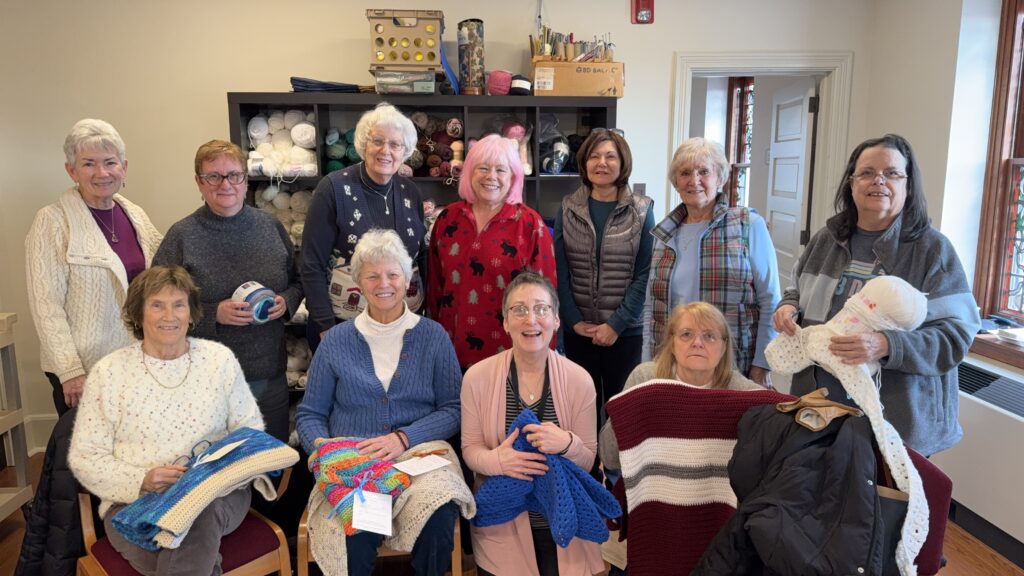
Shawl Ministry celebrated its 20th anniversary earlier this week. It’s a bit surreal to realize that we’ve been knitting and crocheting and praying and bagging and giving away cozy shawls nearly every month for the past 20 years – a total of 2,000 shawls! And that doesn’t count the dozens of baptism blankets or the dorm blankets we make for Derry’s graduating high school seniors.
In that time we’ve sent completed shawls across the country and around the world. Some people who received one in the early years are now receiving a second shawl. Each shawl is a labor of love created by one of our talented makers. Several in our group are not Derry members, but have found us online and mail in shawls or bring them to our regular gatherings on the second Monday of the month.
You may remember the Gospel miracle when Jesus turns jugs of water into fine wine at a wedding feast. That story of a miracle that starts from the most basic elements is one of the things I think about as we work on and pray over our handmade shawls. We begin with soft fibers: yarn hooked or knit into a pleasing pattern. As we work, we pray for the person who will receive the shawl. When we’re done making a shawl, more blessings happen as we pass each completed shawl around our circle. Then the shawls are bagged and delivered to someone in need. Usually it’s one of our own Deacons who makes the delivery.
We pray and we send, and we move on to the next shawl. Once in a while that miracle happens: we receive a note or hear from one of our recipients. “How did you know that blue was my favorite color?” “I took the shawl with me to the hospital.” “I really feel God’s presence when I’m wearing my shawl.” “I can’t believe someone made this just for me.”
We read the notes at our gatherings: these are holy moments. What begins with a slip of yarn and a twist of a needle ends in reaffirming that God knows us, loves us, cares for us. Sometimes I can hardly believe this small soft thing has made such a big difference. In these moments I know God has used us for good, and we are the ones who have been blessed as much or more than the recipients themselves.
I am grateful to the women and men through the years who have supported this ministry with their time and talents and their generous gifts of yarn and donations. I don’t think God is done with us yet, and I can’t wait to see what’s next for this meaningful ministry. Let me know if you’d like to join us as we knit and crochet and pray our way into our third decade.